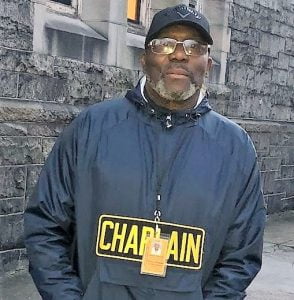
"The church still needs to grow in understanding, to learn to look at what's inside, not outside." -James McCray
As unCUFFED prayerfully develops devotionals on Biblical Social Justice, God has led us to confront some of the most difficult issues facing the church today, including racism and the ongoing challenge of living out racial reconciliation. Historically, Christians have had a hand in both perpetuating and healing the pain of societal divisions; and today, it is important for us to continue listening to and learning from the experiences of our brothers and sisters in Christ. In our discussions about race, we turned to staff member and our African-American brother James McCray, who has experience leading classes about racism in the detention facilities and in local churches, for his wisdom on the subject.
Born in the late 1950s, James grew up in Baltimore City while Civil Rights unrest swept the nation. While his father grew up with hope in the Civil Rights movement, pursuing Christ and becoming a police officer despite policies that forbid Black officers from arresting white people, James felt like he grew up “the opposite.” He ran around the streets, where the harsh result of racism was most evident, fell into the trap of using and dealing drugs, and eventually ended up in prison multiple times. Though each time he was “scared” and “didn’t feel like he could come back from it,” he eventually connected with a pastor and a group of Christian inmates who ministered over him and brought him to Christ. He began “walking the halls not like an inmate, but like a child of God,” which for him also included working through the hurt he had experienced and the bitterness he harbored towards white people and racism in general.
However, another eye-opening moment came when his sister told him that she was about to marry a white man. “I thought I had outgrown everything I had seen in Baltimore City–the riots, the racism–but suddenly in that moment I knew I hadn’t outgrown it,” James said. “It hit me really hard. I didn’t think I could get over it.” Ultimately, he shared his anger with other Christian inmates, who helped him repent of his anger; now, he has come to love and accept his brother-in-law. The experience has shown him that growth around issues of racial prejudice and reconciliation is always possible, and that it is important for Christians to speak openly with one another about the issue, even if their responses aren’t “pretty.” This principle guides his workshops with church leaders, as he always “wants to give them an opportunity to talk and answer questions,” which “usually gets into a deep conversation, where some laugh and some cry” as they are honest with each other about their stories of and feelings towards racial division.
He also wants Christians to know that “the church still needs to grow in understanding” around issues of race. “It’s not easy to understand each other if you have another color of skin,” citing an exercise in his race workshop where participants are shown pictures of Black people and asked to describe them. In the exercise, many see some of the images as showcasing the “angry Black men” stereotype and respond with hesitance, when in reality they depict a Black fraternity at a step-dancing performance. For James, these moments reveal that even in a so-called “post racial” era, Christians still need “to learn to look at what’s inside, not outside” to better understand and support brothers and sisters of different races.
If you are interested in learning more about Biblical reconciliation, we recommend the following Christian books as helpful scriptural guides:

"The church still needs to grow in understanding, to learn to look at what's inside, not outside." -James McCray
As unCUFFED prayerfully develops devotionals on Biblical Social Justice, God has led us to confront some of the most difficult issues facing the church today, including racism and the ongoing challenge of living out racial reconciliation. Historically, Christians have had a hand in both perpetuating and healing the pain of societal divisions; and today, it is important for us to continue listening to and learning from the experiences of our brothers and sisters in Christ. In our discussions about race, we turned to staff member and our African-American brother James McCray, who has experience leading classes about racism in the detention facilities and in local churches, for his wisdom on the subject.
Born in the late 1950s, James grew up in Baltimore City while Civil Rights unrest swept the nation. While his father grew up with hope in the Civil Rights movement, pursuing Christ and becoming a police officer despite policies that forbid Black officers from arresting white people, James felt like he grew up “the opposite.” He ran around the streets, where the harsh result of racism was most evident, fell into the trap of using and dealing drugs, and eventually ended up in prison multiple times. Though each time he was “scared” and “didn’t feel like he could come back from it,” he eventually connected with a pastor and a group of Christian inmates who ministered over him and brought him to Christ. He began “walking the halls not like an inmate, but like a child of God,” which for him also included working through the hurt he had experienced and the bitterness he harbored towards white people and racism in general.
However, another eye-opening moment came when his sister told him that she was about to marry a white man. “I thought I had outgrown everything I had seen in Baltimore City–the riots, the racism–but suddenly in that moment I knew I hadn’t outgrown it,” James said. “It hit me really hard. I didn’t think I could get over it.” Ultimately, he shared his anger with other Christian inmates, who helped him repent of his anger; now, he has come to love and accept his brother-in-law. The experience has shown him that growth around issues of racial prejudice and reconciliation is always possible, and that it is important for Christians to speak openly with one another about the issue, even if their responses aren’t “pretty.” This principle guides his workshops with church leaders, as he always “wants to give them an opportunity to talk and answer questions,” which “usually gets into a deep conversation, where some laugh and some cry” as they are honest with each other about their stories of and feelings towards racial division.
He also wants Christians to know that “the church still needs to grow in understanding” around issues of race. “It’s not easy to understand each other if you have another color of skin,” citing an exercise in his race workshop where participants are shown pictures of Black people and asked to describe them. In the exercise, many see some of the images as showcasing the “angry Black men” stereotype and respond with hesitance, when in reality they depict a Black fraternity at a step-dancing performance. For James, these moments reveal that even in a so-called “post racial” era, Christians still need “to learn to look at what’s inside, not outside” to better understand and support brothers and sisters of different races.
If you are interested in learning more about Biblical reconciliation, we recommend the following Christian books as helpful scriptural guides:
As unCUFFED prayerfully develops devotionals on Biblical Social Justice, God has led us to confront some of the most difficult issues facing the church today, including racism and the ongoing challenge of living out racial reconciliation. Historically, Christians have had a hand in both perpetuating and healing the pain of societal divisions; and today, it is important for us to continue listening to and learning from the experiences of our brothers and sisters in Christ. In our discussions about race, we turned to staff member and our African-American brother James McCray, who has experience leading classes about racism in the detention facilities and in local churches, for his wisdom on the subject.
Born in the late 1950s, James grew up in Baltimore City while Civil Rights unrest swept the nation. While his father grew up with hope in the Civil Rights movement, pursuing Christ and becoming a police officer despite policies that forbid Black officers from arresting white people, James felt like he grew up “the opposite.” He ran around the streets, where the harsh result of racism was most evident, fell into the trap of using and dealing drugs, and eventually ended up in prison multiple times. Though each time he was “scared” and “didn’t feel like he could come back from it,” he eventually connected with a pastor and a group of Christian inmates who ministered over him and brought him to Christ. He began “walking the halls not like an inmate, but like a child of God,” which for him also included working through the hurt he had experienced and the bitterness he harbored towards white people and racism in general.
However, another eye-opening moment came when his sister told him that she was about to marry a white man. “I thought I had outgrown everything I had seen in Baltimore City–the riots, the racism–but suddenly in that moment I knew I hadn’t outgrown it,” James said. “It hit me really hard. I didn’t think I could get over it.” Ultimately, he shared his anger with other Christian inmates, who helped him repent of his anger; now, he has come to love and accept his brother-in-law. The experience has shown him that growth around issues of racial prejudice and reconciliation is always possible, and that it is important for Christians to speak openly with one another about the issue, even if their responses aren’t “pretty.” This principle guides his workshops with church leaders, as he always “wants to give them an opportunity to talk and answer questions,” which “usually gets into a deep conversation, where some laugh and some cry” as they are honest with each other about their stories of and feelings towards racial division.
He also wants Christians to know that “the church still needs to grow in understanding” around issues of race. “It’s not easy to understand each other if you have another color of skin,” citing an exercise in his race workshop where participants are shown pictures of Black people and asked to describe them. In the exercise, many see some of the images as showcasing the “angry Black men” stereotype and respond with hesitance, when in reality they depict a Black fraternity at a step-dancing performance. For James, these moments reveal that even in a so-called “post racial” era, Christians still need “to learn to look at what’s inside, not outside” to better understand and support brothers and sisters of different races.
If you are interested in learning more about Biblical reconciliation, we recommend the following Christian books as helpful scriptural guides:
